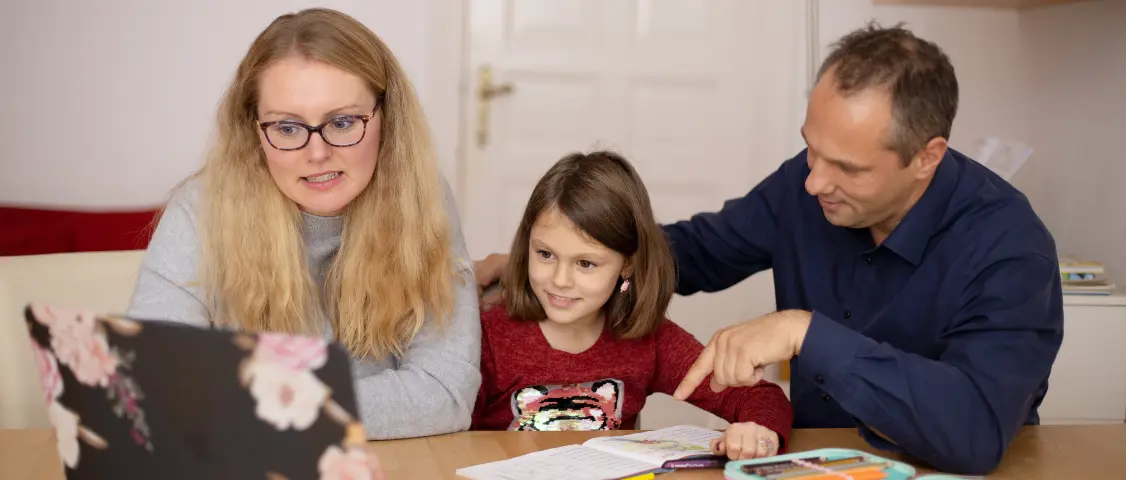Co-parenting after a separation can be one of the most challenging aspects of navigating life post-divorce. This is a time when emotions are intense; finding a way to work together for the benefit of a child can seem daunting.
Co-parenting involves working together as caregivers despite personal differences to provide a robust and supportive environment for children following separation. The purpose is not to reconcile the parents’ relationship but to create a supportive, unified front in caring for their children, who risk instability and uncertainty in their new environments. Effective co-parenting involves clear communication, setting boundaries, sharing responsibilities, and knowing how to settle disputes and work together constructively toward their children’s best interests.
The Role of Parents Post-Separation
Following a separation or divorce, parents’ roles change dramatically. While the focus remains on supporting and nurturing children’s well-being, providing a unified front can be complex and challenging as parents navigate personal differences and balance responsibilities fairly. This shift often involves moving away from a partnership based on shared life goals and towards one that is centered on the needs of the child.
Co-parenting requires parents to share responsibilities and maintain open communication to provide a consistent and nurturing environment. During and after separation, children can experience a range of emotions, including sadness, confusion, and fears of abandonment. During this period, children require emotional support and consistency to understand they are loved and that both parents are committed to their well-being.
While parental reconciliation isn’t the goal, working together, sharing responsibilities, and maintaining boundaries is crucial to providing a unified front to parenting. It requires the parent to put aside their differences with the other parent, and work cooperatively in the best interest of the child.
How Does Co-Parenting Contrast with Parallel Parenting?
Co-parenting is an evidence-based parenting style that prioritizes cooperative decision-making and children’s mental health. Research indicates that, with all other factors being the same, children who live in shared physical custody have better mental health outcomes than children in lone physical custody. Additionally, when parents collaborate without conflict, it significantly reduces the likelihood of mental health issues later in life by providing a more stable environment for the child.
However, it is not feasible for all parents to work together effectively. Some relationships have become so strained that cooperation will likely lead to further conflict. Parallel parenting is an alternative when minimal interaction is necessary to protect the child’s well-being. It involves making separate parental decisions, minimally communicating, and independently setting rules and schedules for the child.
In general, parallel parenting is only preferred if parents cannot reconcile their differences and cannot work together in the best interests of their children. In these situations, the likelihood of conflict outweighs the possibility of effective communication, and parents are independently responsible for their children’s well-being. However, co-parenting counseling is an effective option for parents in high-conflict relationships to develop open communication and healthy boundaries without resorting to conflict.
Navigating Common Challenges in Co-Parenting
While it is possible for separated parents to leave each other on good terms, the reality is that many parents have unresolved emotions toward one another. Conflict and lack of consistent communication are common issues that arise post-separation.
Despite raw emotions, the central focus of co-parenting is children’s well-being. Effective co-parenting often means prioritizing children over individual resentment toward the other parent. Disagreements will arise during co-parenting, often over parenting styles, scheduling, or the resurfacing of past grievances. Navigating these challenges means setting effective boundaries and finding common ground in raising children. For some people this may seem natural and easy to accomplish. For others, these skills need to be developed and practiced. Co-parenting counseling can help in this situation.
Supporting Children’s Well-Being
Ensuring the well-being of children is the most critical aspect of co-parenting. Children can experience a range of emotions during this time, including confusion, sadness, and anxiety. Depending on a child’s age and development, these feelings can manifest as taking responsibility for their parent’s separation, having separation anxiety, or believing they can reconcile their parents’ relationship. Children most likely won’t understand why separation is happening and be unsure about their role in the new family arrangement.
In supporting children, consistency and communication are key. Children benefit the most from a unified parenting approach, which involves parents working together to set home rules, schedules, disciplinary methods, and shared items across households. The more consistent a child’s environment is, the better the mental health outcomes of children and the less likely they are to have behavioral problems later in life.
Additionally, open communication is vital. This means clear communication between parents on boundaries and shared responsibilities, but it also means maintaining clear communication with children, explaining things, and being honest about what is happening in age-appropriate terms.
How to Begin Co-Parenting Successfully
The first step in co-parenting is establishing a clear parenting plan that outlines schedules, responsibilities, and communication methods. For instance, parents can work on determining how to conduct drop-offs when changing custody, coming up with a consistent time that works with each parent’s schedules, and creating a list of toys, books, and other items that are either present in both households or always travel with the child between households. This shared parenting plan serves as a guide, helping both parents stay consistent in their roles and expectations.
Additionally, parents should maintain open and respectful communication with their co-parents. This communication can be facilitated through regular meetings or mediated with a co-parenting counselor. Co-parenting counseling offers a structured and nonjudgmental setting where parents can work together and manage disputes constructively and away from their children. Counseling can be particularly helpful for high-conflict relationships to reinforce effective communication strategies and settle disputes with a neutral third party, allowing parents to focus on their children rather than dwelling on past issues.
Below are effective strategies to co-parent that emphasize communication and consistency in promoting children’s well-being.
- Focus on the Child: Always keep the conversation centered around the child’s well-being, setting personal differences aside.
- Establish Clear Boundaries: Set specific limits on what topics are discussed and how often communication occurs. For instance, agree that discussions about personal relationships or past grievances are off-limits during co-parenting conversations and when children are present. Instead, focus solely on topics like scheduling, school activities, and healthcare.
- Use Neutral Language: Avoid emotionally charged words or phrases, especially ones that imply blame. For instance, rather than saying, “You’re so disorganized and forgetful,” you can say, “I noticed the homework wasn’t in her backpack yesterday; let’s find a way to ensure she brings her homework to school going forward.”
- Practice Active Listening: Make an effort to truly listen to what the other parent is saying without interrupting. Acknowledge their perspective and summarize what they say with your concerns rather than downplaying or ignoring what was said. For instance, instead of replying with “You’re wrong,” reply, “It sounds like you’re worried about how our child is adjusting to the new school routine. Let’s talk about how we can support them.”
- Schedule Regular Check-Ins: Set up consistent times to discuss co-parenting. Regular check-ins help prevent misunderstandings and ensure that both parents are on the same page.
- Seek Professional Support: If direct communication is consistently unproductive, having a professional counselor can help mediate discussions and resolve disputes in a structured, empathetic environment where both parents are heard and respected.
Strengthen Your Parenting Relationship With Start My Wellness
Co-parenting is an evidence-based strategy for providing children with stability and emotional support following separation or divorce. In focusing on communication, consistency, and children’s well-being, parents can work together to create a nurturing environment, despite potential personal issues.
At Start My Wellness, we understand the complexities of co-parenting and the importance of maintaining a healthy parenting relationship post-separation. Our team is dedicated to helping families navigate these challenges through tailored support and counseling. We’re here to guide you every step of the way, ensuring all parties work together effectively in supporting their children.
If you’re ready to strengthen your co-parenting relationship, contact Start My Wellness at (248)-514-4955 and meet our counselors to schedule a consultation and take the first step toward a healthier co-parenting experience.
Sources
- Frontiers in Psychology: Healing the Separation in High-Conflict Post-divorce Co-parenting
- Psychology Today: Co-Parenting or Parallel Parenting: How to Know What’s Right
- PLoS One: Systematic review and theoretical comparison of children’s outcomes in post-separation living arrangements
- Start My Wellness: What is Co-Parenting Counseling, and How Does it Work?
- Psychology Today: Challenges of Co-Parenting Children

Author: Anton Babushkin, PhD
Looking for a Therapist? Start My Wellness has highly experienced Licensed Therapists that are currently accepting new patients.


